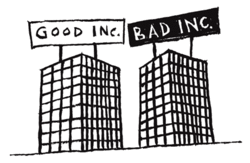Responsible Investor | July 5th, 2012
$100bn interfaith investor group sets out guidelines on commodities and land investments
300-member ICCR releases guidance for institutional investors
by Daniel Brooksbank
The Interfaith Centre on Corporate Responsibility, the US investor group with 300 institutional investor members with over $100bn (€79.9bn) in invested capital, has published recommended guidelines for investing in commodities and land.
Regarding commodities, the ICCR says that institutional investors who are not currently participating in the commodities markets are encouraged not to enter the asset class.
And investors who are already in these markets should avoid making new direct investments in food commodities and/or their derivatives. They should also avoid investing in food commodity indices and exchange traded funds (ETFs).
The ICCR says: “Institutional investors have an important role to play in ensuring the proper functioning of commodities futures markets.
“The ability to catalyze growth and prosperity through prudent and thoughtful investment is as real as its opposing outcome: the potential to destabilize markets leading to catastrophic famines affecting millions worldwide.
“ICCR urges investors to take this responsibility seriously and to consider the social impacts of their investment decisions.” The new guidelines appear in the ICCR’s latest newsletter, The Corporate Examiner: the Company We Keep. [PDF]
For the asset class, the ICCR has four recommendations. They are:
1. Implement responsible policies for existing food commodities investments that acknowledge social and environmental impacts
2. Disclose the ESG impact of trading in food commodities
3. Advocate for improved regulation of global commodities trading
4. Support appropriate investments in the production of food, such as impact investing.
As for land investments, the ICCR acknowledges that there are already published principles to help investors avoid participating in land grabs. It says its guidelines draw from these principles, focus them against an audience of institutional investors and frame them within the United Nation’s Guiding Principles on Business and Human Rights.
The four-point land investment guidelines:
1. Assess Impacts and Risks
2. Implement Human Rights and Environmental Policies
3. Establish Grievance Mechanisms
4. Monitor and Disclose














